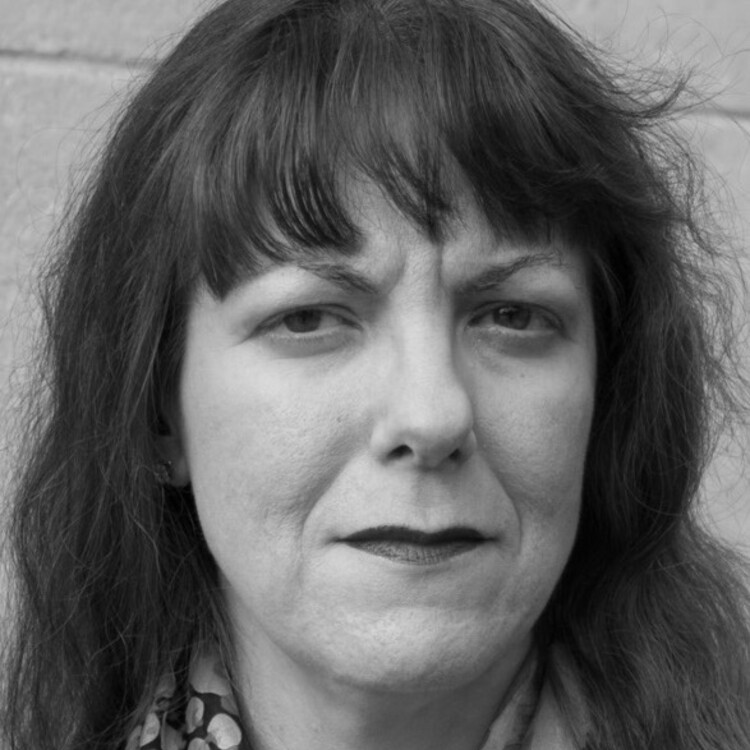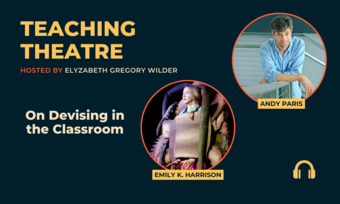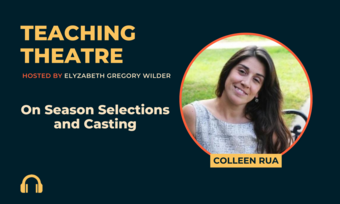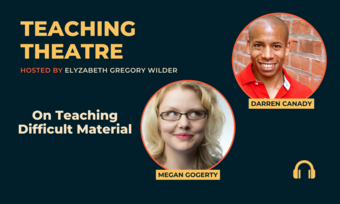Your Guide to Theater Education
Caridad Svich
In this series, David Dudley looks at the different models of theater education around the country through interviews, with the hopes that a new student will have an easier time finding the model that works for them.
Caridad Svich is a playwright who walks the walk, and talks the talk. Her plays have been read and performed throughout the world, garnering her numerous awards—including the OBIE award for lifetime achievement, in 2012. And yet she continues to educate the next generation of theater artists. Besides teaching independent workshops through Austin ScriptWorks, and NoPassport, she has also taught and lectured at Harvard, Yale, and Rutgers—to name a few.
When was NoPassport's program started?
NoPassport theatre alliance began in 2001 as a core collective of twelve playwrights, actors, and musicians who were—and still are—interested in theatrical experimentation, especially in regards to text and music. The idea was to form a playwrights’ band and sometimes make work together as a collective, and at other times share research methodologies and thoughts on theater and performance. Most of us did not live in the same city—and still don’t. So, part of the founding of NoPassport had to do with being able to share and make work across long distances.
In 2003, NoPassport’s mission shifted somewhat. I curated and organized a panel in US Latina/o playwriting and the state of the art at INTAR in NYC under my TCG/Pew Arts Residency with the theater. Part of the desire to organize the panel had to do with bringing together established and emerging Latina/o playwrights from across the country to one public conversation. As a result of it, I asked the core collective of NOPE (as we call ourselves playfully) whether we could become perhaps something else: a hub of sorts for artists interested in and making works that focused on cross-cultural exchange marked by aesthetic difference. The core collective said yes, and the version of NoPassport that exists now was born. It is an unincorporated, independent artist-based and driven platform to advocate for, publish, and produce works that are reflective of our core mission—across borders, no borders, rich in diverse exchange and multiplicity of ideas.
In 2008, I founded NoPassport Press. We have published print on-demand more than twenty titles thus far—new plays, translations, essays, and short fiction. The publication arm of NoPassport is also one of advocacy, championing new writing in print and especially work that may not otherwise be readily available and/or known by a general theater arts and performance studies readership.
What does NoPassport's Educational opportunities offer potential collaborators?
Our educational opportunities usually fall under the rubric of staging theater conferences in partnership with arts organizations and universities. We staged five conferences at the Martin E. Segal Theatre Center at CUNY Graduate Center, two at the Nuyorican Poets Café, one at ASU-Tempe, one at NYU Gallatin School 2013, and this year at LSU-Baton Rouge. The last three conferences are all archived on HowlRound TV for anyone who wants to see. The conferences are generally organized under a theme: utopia, crossing borders, and diaspora are all topics we have addressed. Usually there is a follow-up publication component to the conferences we stage. I wish to reiterate that everything we do is artist-driven. We have no infrastructure. We exist as a loose membership of about 600 artists and scholars on a moderated list-serve. Our fiscal sponsorship is through Fractured Atlas and we subsist entirely on donations. But I hope that what NoPassport as idea (for art-making) and actuality can offer potential collaborators is a space (virtual or otherwise) to meet other artists, share ideas, and promote knowledge of existing work being made across the US and abroad, and basically offer a kind of ever-shifting mobile home for those who are interested in making work unbound by categories and labels and prescribed cultural markers.
What makes NoPassport's program different from others?
Hard to say. I think perhaps that our platform is visible but not too visible. John Jesurun once described our publication imprint as a boutique indie label that you had to seek out a bit to find. I think there is something underground and over-ground about NoPassport, which perhaps makes it different conceptually than other existing platforms in the arts.
What are the guiding principles of the program?
Solidarity. Peace. Art. Community. Being with.
Following that, what's working?
NoPassport’s most “successful” legacy thus far is its publications imprint. Although we don’t do huge print runs and so forth, over the years, I feel we have gained the respect of fellow authors and the field with the kind of work we do and how we advocate for publication and the quality of the work we do publish.
What kinds of challenges have you faced? How do you intend to approach them in future?
Funding is the key challenge. Most of the time whatever NoPassport does is still funded to a degree on a wing and a prayer, through lots of pro bono work, through my credit card sometimes. I think that in order for NoPassport to find fiscal support, I would need to take time away/off from my own art-making for at least a year or so and dedicate myself to grant writing and such. But I am a theatermaker. That’s what I do. In a way, my art-making and its ethos is closely tied to NoPassport. I am not ready to give up the art in order to wear an administrative hat exclusively. I think that’s what it would take. But I would love to figure out a way to balance both.
What's missing, in your opinion, from the current education/ training programs available?
We are not a training program. We do not offer a degree or a certificate. I want to make that clear. We are an artists’ collective—or shall we say, an arts service organization. Whatever we offer by way of mentorship and education is through how we bridge art and academia through conferences and publications.
Who do you feel is the ideal candidate? Who are you trying to bring into the NoPassport family?
Practitioners who believe in making work and not branding it. I think there is a strong push on young artists to “brand” what they do. I think that can be potentially damaging because as soon as you brand yourself, you limit and/or narrow your possibilities.
Any changes planned for the future?
None that I can foresee at the moment. I dream of having an arts center one day devoted to the NoPassport idea.
Success stories?
Our books. Our authors. Their works are in the world. That, to me, is a measure of success.











Comments
The article is just the start of the conversation—we want to know what you think about this subject, too! HowlRound is a space for knowledge-sharing, and we welcome spirited, thoughtful, and on-topic dialogue. Find our full comments policy here
Thanks for doing this, David. Caridad, you are just lovely, so articulate and you do such important work for all of us.
Of course, Roxanne. It's a real pleasure and honor to interview these artist/ educators. I hope the interviews do them and their endeavors justice.
Viva Caridad y No Passport! Caridad is that rare breed--an artist, a scholar, an agitator, a community organizer and a connector, and through it all her art remains beautiful, necessary and prolific.